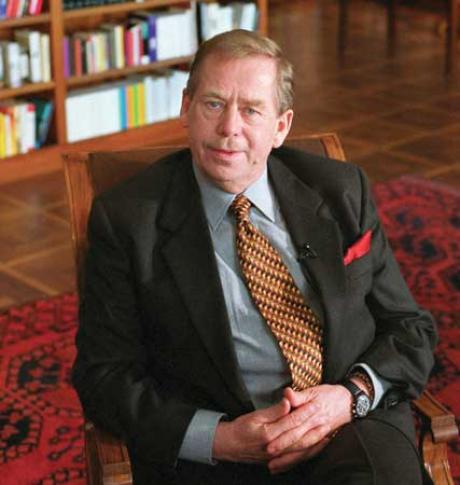Latest News
Václav Havel (1936-2011)

Václav Havel was a Czech playwright, essayist, poet, dissident and politician. He was the tenth and last President of Czechoslovakia (1989–92) and the first President of the Czech Republic (1993–2003).
Vaclav Havel's death is a reminder of something which parts of modern Europe – and perhaps Britain in particular – are in danger of taking for granted, at best, and, at worst, of forgetting altogether. We live in a time in which an increasingly introverted and fearful Europe is becoming synonymous with failure and impossibility, in which political leadership is treated with contempt and exasperation, and in which politics is all too often dismissed as corrupt, craven and irrelevant. Havel's personality and career, though, were the antithesis of all of these gloomy current prejudices.
At his best, President Havel was a genuinely national leader with a dynamic understanding of Europe, a politician whose vision and wit embraced not just the art of the possible but of the impossible too, and a civic leader whose sense of what is worthwhile in life transcended materialism – massively important though that was for eastern Europeans whose aspirations had been denied for so long – to embrace the imaginative and intellectual. In an era in which Europe is now so often spoken of with a sneer, he is a reminder of a very recent time when Europe embodied something noble and liberating which was eagerly shared – even here.
The playwright turned president came from a part of Europe, the then Czechoslovakia, which in the 19th and early 20th centuries had been integral to the evolution of European politics, culture and economics, but in which, as Havel himself put it, the clock had stopped after the second world war. As a result, the two halves of Europe lost touch with each other. No one, arguably, did more than Havel, first as a dissident and then as a president, to try to bring them back together. His efforts were only partly successful, but it is to him, more than to any other leader, that we owe not just the peaceful overthrow of communism in the former Czechoslovakia, but the later peaceful divorce between the Czech Republic and Slovakia and, every bit as important, the active embrace of the former eastern bloc by the European Union. Even today, this ranks as a mighty historical achievement by any leader, never mind by one who thought of himself primarily as a writer.
Havel belonged to a generation which, having witnessed the Soviet repression of Hungary in 1956 and of Czechoslovakia itself in 1968, recognised that, for them, socialism was both a failure and an incubus. For years after 1968, the dissident path which Havel took in Franz Kafka's homeland appeared both hopeless and dangerous. As the Soviet empire finally faltered, however, Havel's moral authority became one of the keys which unlocked a better future. Of the four emblematic eastern European figures of the era – the others were Mikhail Gorbachev, Pope John Paul II and Lech Walesa – Havel, as the only true liberal of the four, was the one who could both speak for his own people and at the same time command support on the left and right both at home and abroad.
Not even Havel was able to sustain that effort indefinitely. As politicians do, he became unpopular, unable to resist the forces of consumerism and nationalism alike. At this sad time of his too early death, Havel may appear to belong to a long lost era, whose spirited defiance of Soviet-imposed totalitarianism and engaging civic optimism in the transitional post-totalitarian years have nothing to offer to the Czech or European experience of today. Yet nothing could be further from the truth. All Europeans, Czechs as well as British, belong to relatively small nation states which share an interlocked global destiny as power and wealth shift from Europe and North America to Asia and the south. All have to reconcile their patriotism with globalising pressures without collapsing into nationalist rivalries. And all have to be open to the new, the brave and the difficult without abandoning the moral, the wise and the treasured. In that sense, Vaclav Havel's Europe belongs not to the past but the future. Guardian
Rate this article




 del.icio.us
del.icio.us Digg
Digg

Post your comment